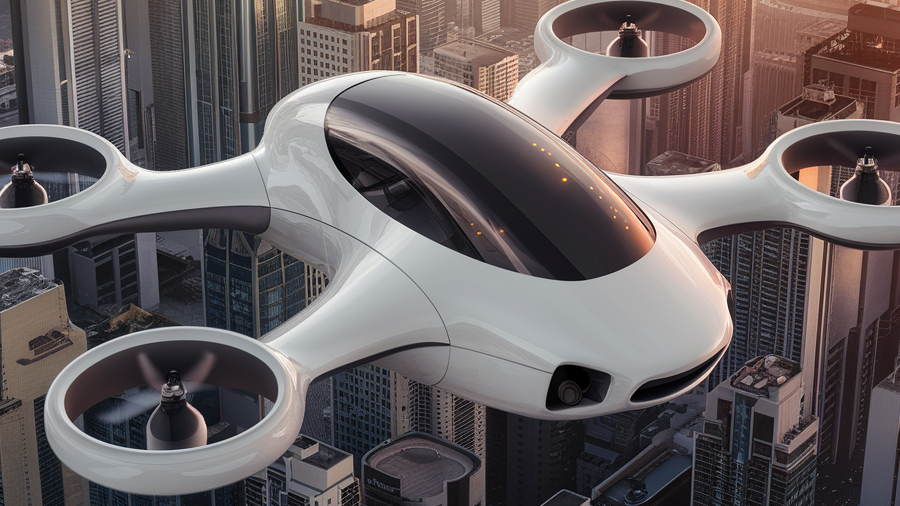The Global Drone Taxi Market is an emerging sector within the urban air mobility (UAM) landscape, aiming to revolutionize transportation by offering autonomous aerial vehicles for passenger travel within urban environments. These electric vertical take-off and landing (eVTOL) vehicles are designed to alleviate traffic congestion, reduce travel times, and provide an eco-friendly alternative to traditional ground transportation. As technological advancements and regulatory frameworks continue to evolve, the drone taxi market is poised for significant growth in the coming years.
Industry Trends
- Technological Advancements:
- Electric Propulsion Systems: The development of efficient and sustainable electric propulsion systems is a key trend, enabling longer flight times, reduced noise, and lower emissions.
- Autonomous Flight Technology: Advances in AI and machine learning are enhancing autonomous flight capabilities, improving safety, navigation, and operational efficiency.
- Battery Innovations: Improvements in battery technology, such as higher energy density and faster charging times, are critical for extending the range and operational capacity of drone taxis.
- Urban Air Mobility (UAM) Integration:
- The integration of drone taxis into existing urban transportation networks is a growing trend, with cities planning for air corridors, vertiports, and supporting infrastructure.
- Focus on Safety and Regulations:
- The industry is increasingly focused on developing robust safety standards and working with regulatory bodies to create comprehensive frameworks for the certification and operation of drone taxis.
- Sustainability Initiatives:
- Drone taxis are being positioned as an environmentally friendly alternative to traditional vehicles, contributing to reduced carbon footprints and supporting sustainable urban development.
- Public Acceptance and Awareness:
- Increasing efforts are being made to educate the public about the benefits and safety of drone taxis, aiming to build trust and acceptance of this new mode of transportation.
Get Thorough Information in Our PDF Brochure: https://www.marketsandmarkets.com/pdfdownloadNew.asp?id=39967417
Opportunities
- Growing Urbanization:
- Rapid urbanization and increasing traffic congestion in major cities present significant opportunities for drone taxis as a solution for efficient, on-demand urban transportation.
- Tourism and Leisure:
- The tourism industry offers opportunities for drone taxis to provide unique aerial sightseeing experiences and fast transfers between tourist destinations.
- First-Mover Advantage:
- Companies that establish early partnerships with regulatory bodies and municipalities can gain a competitive edge in the market, setting standards and securing key operational routes.
- Logistics and Parcel Delivery:
- Beyond passenger transport, drone taxis can be adapted for logistics and cargo delivery, offering efficient solutions for last-mile delivery in urban areas.
- Investment and Funding:
- The sector is attracting significant investment from venture capital firms, tech giants, and automotive companies, providing the financial resources necessary for research, development, and commercialization.
Market Dynamics
- Regulatory Frameworks:
- The development and implementation of regulatory frameworks for drone taxi operations are crucial for market growth. Compliance with aviation safety standards and airspace management is a key focus.
- Infrastructure Development:
- The creation of supporting infrastructure, such as vertiports, charging stations, and air traffic management systems, is essential for the successful integration of drone taxis into urban environments.
- Technological Challenges:
- Overcoming technological hurdles related to autonomy, battery life, and noise reduction is critical for achieving commercial viability and widespread adoption.
- Competitive Landscape:
- The market is highly competitive, with numerous startups and established aerospace companies vying for leadership. Innovation, strategic partnerships, and cost-effective solutions are key differentiators.
- Public Perception and Trust:
- Building public trust in drone taxi safety and reliability is a major factor influencing adoption. Effective communication, demonstrations, and pilot programs are essential to gaining public acceptance.
Discover All the Steps in Our Detailed Sample: https://www.marketsandmarkets.com/requestsampleNew.asp?id=39967417

Partnerships
- Collaboration with Municipalities:
- Partnerships with city governments and urban planners are vital for integrating drone taxis into existing transportation networks and ensuring compliance with local regulations.
- Alliances with Aviation Authorities:
- Working closely with aviation authorities helps companies navigate regulatory requirements, gain certifications, and influence policy development for UAM.
- Tech and Automotive Partnerships:
- Collaborations with tech and automotive companies facilitate the integration of advanced technologies, such as autonomous systems and electric propulsion, into drone taxi designs.
- Infrastructure Development Partnerships:
- Partnering with infrastructure providers for the development of vertiports, charging stations, and air traffic management systems is essential for supporting drone taxi operations.
- Academic and Research Institutions:
- Collaborations with universities and research organizations drive innovation in aerodynamics, battery technology, and AI, accelerating the development of advanced drone taxi solutions.
Key Companies
- Uber Elevate (Acquired by Joby Aviation):
- Uber Elevate, now part of Joby Aviation, focuses on developing an aerial ridesharing network, leveraging its expertise in ridesharing logistics and urban mobility.
- Joby Aviation:
- Joby Aviation is a leader in the drone taxi market, developing all-electric eVTOL aircraft with a focus on sustainability, efficiency, and quiet operation.
- Lilium GmbH:
- Lilium is known for its innovative electric jet technology, aiming to provide regional air mobility services with its high-speed, long-range eVTOL aircraft.
- Volocopter GmbH:
- Volocopter is developing autonomous air taxis designed for urban environments, emphasizing safety, comfort, and ease of use.
- EHang:
- EHang is a pioneer in autonomous aerial vehicles, offering passenger and logistics solutions with its smart, eco-friendly drone taxis.
- Airbus Urban Mobility:
- Airbus Urban Mobility focuses on integrating urban air mobility solutions into existing transportation networks, leveraging Airbus’s aerospace expertise.
- Vertical Aerospace:
- Vertical Aerospace is developing advanced eVTOL aircraft for commercial air taxi services, focusing on zero-emission solutions and sustainable transportation.
The Global Drone Taxi Market is on the cusp of transformation, driven by technological advancements, urbanization, and the need for sustainable transportation solutions. As key industry players push forward with innovation, strategic partnerships, and regulatory engagement, drone taxis are set to become a viable and integral part of urban mobility. The successful integration of drone taxis into urban transportation networks promises to enhance connectivity, reduce congestion, and contribute to a greener, more efficient future in urban transportation.
